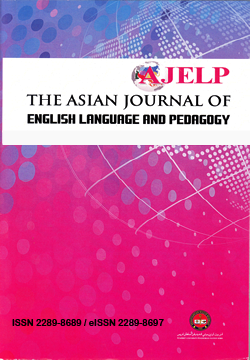EFL Students’ Readiness for independent Learning Observed from their Self-Regulation in Post COVID-19 Outbreak
DOI:
https://doi.org/10.37134/ajelp.vol11.2.2.2023Keywords:
Covid 19 Outbreak, EFL Students’ Readiness, Independent Learning, Self- regulationAbstract
In the last couple of years, the students have experienced full online learning due to pandemic outbreak. In this mode of instruction, independent learning (also known as self-study) becomes the essential part of learning. This study aims to investigate the students’ readiness in doing independent learning after experiencing it for two years and find out how they perceive technology in doing so. 127 sophomores participated to fill in two Likert-scale questionnaires. Quantitatively speaking, the students were deemed ready to do more independent learning in the future as they were aware of metacognitive skills needed, more comfortable learning environments, high persistence and the act of help-seeking. However, time-management was still the issue in which the students struggle to set it. In addition, in regard to students’ perception on the use of technology in doing independent learning, almost all participants were in one voice to affirm that technology is necessary part of learning and they were highly informed of technological merits.
Downloads
References
Adams, D., Sumintono, B., & Mohamed, A. (2018). E-Learning Readiness Among Students of Diverse Backgrounds in A Leading Malaysian Higher Education Institution. Malaysian Journal of Learning and Instruction, 15(2), 227–256.
Al-Amri, M. (2020). Investigating EFL Students’ teacher perception of self-study in Saudi Arabian Context. Journal of Education for Teaching, 47(1), 75-88.
Bidokht, M.H., & Assareh, A. (2011). Life-long Learners through Problem-based and Self-Directed Learning. Procedia Computer Science. 3, 1446-1453.
Chen, N. S., Cheng, I. L., & Chew, S. W. (2016). Evolution is not enough: Revolutionizing current learning environments to smart learning environments. International Journal of Artificial Intelligence in Education, 26(2), 561- 581.
Chinaza, N.K., Juliana, A.C.B.A., & Efeyaelu, U.H. (2015). Compueter Self-Efficacy, Computer-Related Technology Dependance and Online Learning Readiness of Undergraduate Students. International Journal of Higher Education Management (IJHEM), 1 (2), 60-71.
Dontre, A.J. (2021). The Influence of Technology on Academic Distraction; A Review. Hum Behav & Emerg, 3, 379-390.
Farahani, M. (2014). From spoon feeding to self-feeding: are Iranian EFL learners ready to take charge of their own learning? Electronic Journal of Foreign Language Teaching, 11, 98–115.
Goodwill, A., & Chen, A. S. H. (2021). The science of lifelong learning. The United Nations Educational, Scientific and Cultural Organisation Institute for Lifelong Learning.
Gürsoy, G. (2021). Digital Storytelling: Developing 21th Century Skills in Science Education. European Journal of Educational Research. 10 (1), 97-113.
Imran, M., Kalantan, S.A., Alkorbi, M.S., & Shamim, M.S. (2021). Perceptions of Saudi Medical Students Regarding Self-Directed Learning; A Qualitative Study. J Pak Med Assoc. 71 (5), 1403-1408.
Jansen, R.S., Leeuwen, A.V., Janseen, J., Kester, L., & Kalz, M. (2016). Validation of the Self-Regulated Online Learning Questionnaire. J. Comput High Educ. DOI 10.1007/s12528-016-9125-.
Karatas K., & Arpaci I. The Role of Self‐Directed Learning, Metacognition, and 21st Century Skills Predicting the Readiness for Online Learning. Contemp Educ Technol. 2021;13(3):371‐377. doi:10.30935/cedtech/10786
Knowles, M. S. (1975). Self-directed learning: A guide for learners and teachers. New York: Association Press.
Li, L., & Lee, L. (2016). Computer Literacy and Online Learning Attitude Toward Gsoe Students In Distance Education Programs. Higher Education Studies, 6(3), 147–156.
Moore, M. G. (1973). Toward a theory of independent learning and teaching. Journal of Higher Education, 44(9). 661-679. https://doi.org/10.2307/1980599.
Mohideen, R.S., Ramlan, A.F., & Kamal, R,M. (2020). Online Distance Learning Readiness During Covid-19 Outbreak among Undergraduate Students. International Journal of Academic Research in Business and Social Sciences. 10 (5), 642-657.
Omar, S., Shaharuddin, W.Y.W., Azim, A.F., Nawi, N.S.M., Zaini, M., & Syahfutra, W. (2021). Academic Motivation in English Online Course; A Comparative Study of Universities in Malaysia and Indonesia. Indonesian Journal of Applied Linguistics, 11(2), 477-487.
O’Shea, E. (2003). Self-directed learning in nurse education: A review of the literature. Journal of Advanced Nursing 43, no. 1: 62_7
Stewart, R.A. (2007). Investigating the link between self-directed learning readiness and project based learning outcomes: the case of international Masters Students in an engineering management course. European Journal of Engineering Education, 6 (1), 59-62. doi. 10.1080/03043790701337197
Tamer, O. (2013). Students’ Readiness for Autonomous Learning of English as a Foreign Language. Unpublished MA thesis, University of Sunderland, UK.
Tekkol, I.A., & Demirel, M. (2018). An Investigation of Self-Directed Learning Skills of Undergraduate Students. Students.Front. Psychol. 9, 1-14. https://doi.org/10.3389/fpsyg.2018.02324
Taqi, A.A. (2019). The perspective of Kuwaiti Students Towards the Effectiveness and Value of Self-Study. International Education Studies, 12(9), 105- 116.
Wahyudi, G,S., Artini, L.P., & Padmadewi, N.N. (2021). Self-directed learning in EFL During Covid -19 Pandemic: An Analysis of Teachers’ Perception and Students’ Learning Autonomy. International Journal of Language and Literature, 5 (2), 93-104.
Downloads
Published
Issue
Section
License
Copyright (c) 2023 Ririn Ovilia, Syafitri Ramadhani, Fitrawati

This work is licensed under a Creative Commons Attribution-NonCommercial-ShareAlike 4.0 International License.





